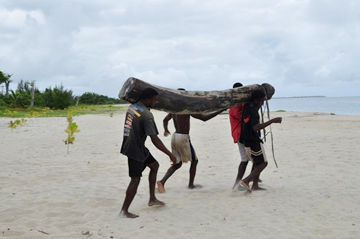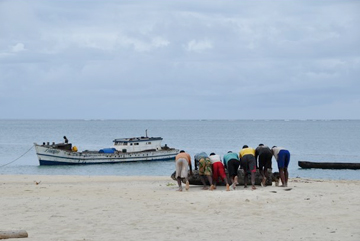World Bank, European governments finance illegal timber exports from Madagascar
Rowan Moore Gerety | special to wildmadagascar.org in mongabay | January 11, 2010
While Madagascar's current government has drawn sharp criticism from the international community for its failure to prevent the environmental destruction of recent months, France, Holland, Morocco, and the World Bank have all been implicated in financing illegal logging operations in Madagascar's national parks over the past year. Even as foreign governments condemned the surge in illegal logging last year, many--either directly or through institutions they support--are shareholders in the very banks that have financed the export of illegal lumber from Madagascar's SAVA region. The Bank of Africa Madagascar, for instance, is part owned by Proparco, a subsidiary of the Agence Française du Développement, as well as the World Bank's International Finance Corporation, Dutch development bank FMO, and the Banque Marocaine du Commerce Extérieur. Société Générale and Crédit Lyonnais, both part-owned by the French government, have also provided loans to illegal timber traders.
Rosewood logs being transported to a boat off a beach on the Masoala Peninsula. Photo taken in December 2009.
The involvement of western governments and international institutions in illegal logging is all the more striking since the EU, France, the US, the World Bank, and IMF all suspended some level of financial support to Madagascar in the midst of the political crisis that swept former president Marc Ravalomanana from power last year. No foreign government recognizes the current administration of Andry Rajoelina, and aid was suspended in the name of restoring order and improving governance.
Now, it turns out that the investment dollars of those same governments--directly in the case of France, the Netherlands, and Morocco, and through contributions to the World Bank for the rest--are going to support illegal logging, an industry that relies heavily on corrupt governance at every level and which violates a number of Malagasy laws. The IFC and FMO each own more than 10% of shares in Bank of Africa Madagascar, while Proparco (a French government institution) and the Moroccan government each hold a stake in the wider Bank of Africa group, a 40% shareholder in Bank of Africa Madagascar. The French government also holds roughly 4% of Société Générale through the Caisse des Dépots and through its stake in the insurance company CNP. Crédit Lyonnais is a subsidiary of the majority public-owned Crédit Agricole.
Intensive logging of precious woods has occurred in the region's protected areas throughout the past year, but timber traders have not been able to export rosewood reliably as soon as it is cut. Sporadic enforcement of Malagasy bans on exporting precious woods has compelled timber traders to stockpile large amounts of rosewood in depots awaiting export authorizations. "The value of these stockpiles is staggering," writes Erik Patel, a biologist who does research in SAVA.
Overview of the logging crisis. Click image for PDF.
This poster was prepared by researchers at the Missouri Botanical Gardens and other groups. The Missouri Botanical Gardens has played a key role in documenting and working to end the destruction of Madagascar's rainforests.
Down payments for illegal lumber exports are seldom more than 50% of final sale value, making cash flow a problem even in such a lucrative industry. With so much capital tied up in existing stock, timber traders have come to rely on banks to finance their exports and their ongoing logging operations.
Cargo manifests from regional ports indicate that Bank of Africa Madagascar has provided loans to 11 of 15 major timber traders, while BFV Société Générale, a subsidiary of Société Générale--one of the largest banks in the world--has provided loans to two of the largest timber traders. A report compiled last fall by the Environmental Investigation Agency and Global Witness at the request of the Malagasy government found that Bank of Africa Madagascar financed more than half of declared exports from the SAVA region in the first part of 2009, with Société Générale funding the balance. Crédit Lyonnais has been tied to more recent shipments.
Though timber traders have also relied on an informal network of Chinese importers in Madagascar for additional financing, these banks continue to abet illegal logging and timber trading without facing the same public outcry that has resulted in campaigns against shipping companies like Delmas, a company based in France that has been the most prominent transporter of rosewood over the past year. It is time for governments that denounce logging and other environmental destruction in Madagascar to take a more probing look at their own involvement.
Video: MADAGASCAR RAINFOREST MASSACRE












No comments:
Post a Comment